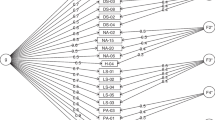Abstract
A comprehensive set of variables that have been supported as contributing to overall health and general well-being were analyzed to determine their simple structure using factor analysis and their relative contribution using Pearson correlation. The contributors to general well-being had been theoretically grouped into: emotions, beliefs, temperaments, behaviors, sittuations, experiences and health. The empirical factor structure was compared with the theoretical structure used to develop the variables. Stability was investigated by comparing results with those of another geographically separated group. All subjects were normally functioning working adults. The results demonstrated the feasibility and potential usefulness of using self-report questionnaires with multivariate procedures to measure components of the global general well-being concept.
Similar content being viewed by others
References
Andrews, F. and Crandall, R.: 1976, ‘The validity of measures of self-reported well-being’, Social Indicators Research 3, 1–19.
Antonovsky, A.: 1979, Health, Stress, and Coping (Josey-Bass, San Francisco).
Brook, R., Ware, J., Davies-Avery, A., Stewart, A., Donald, C., Rogers, W., Williams, K., and Johnston, S.: 1979, ‘Overview of adult health status measures fielded in Rand's Health Insurance Study’, Medical Care 17(1).
Dimsdale, J.: 1988, ‘A perspective on type A behavior and coronary disease’, New England Journal of Medicine 318(2), 110–112.
Heady, B., Holmstrom, E., and Wearing, A.: 1984, ‘Well-being and ill-being: different dimensions’, Social Indicators Research 14, 115–139.
“Health risk appraisals”: 1985, Pathfinders (NHIC, Washington D.C.).
Nie, N., Hull, C., Jenkins, J., Steinbrenner, K., and Bent, D.: 1975, Statistical Package for the Social Sciences (McGraw-Hill, New York).
Wan, T. and Livieratos, B.: 1978, ‘Interpreting a general index of subjective well-being’, Milbank Memorial Fund Quarterly/Health and Society 56(4), 531–556.
Wheeler, R.: 1981a, ‘Factors of general well-being’ (Doctoral Dissertation, St Louis University, 1980). Dissertation Abstract International 42(4), 1593-B (University Microfilms No. 81-20657).
Wheeler, R.: 1981b, ‘Factors of well-being and health promotion’, Proceedings of the 17th Annual Meeting of the Society of Prospective Medicine (Stevens Point, WT), pp. 60–62.
Wheeler, R. and Frank, M.: 1988, ‘Identification of stress buffers’, Behavioral Medicine 14(2), 78–88.
Author information
Authors and Affiliations
Rights and permissions
About this article
Cite this article
Wheeler, R.J. The theoretical and empirical structure of general well-being. Soc Indic Res 24, 71–79 (1991). https://doi.org/10.1007/BF00292651
Accepted:
Issue Date:
DOI: https://doi.org/10.1007/BF00292651




